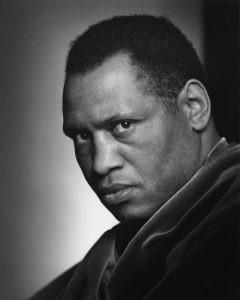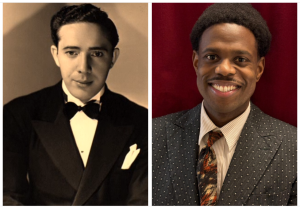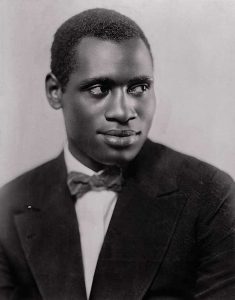Podcast: Play in new window | Download (Duration: 1:40:08 — 105.2MB) | Embed
Subscribe: Spotify | TuneIn | RSS | More
I am here visiting my family in Milwaukee this week, a time which has proven to be a landmark in the downward spiral of our country into fascism. And all right here in our own backyard! It all struck way too close to home for me when the minister at my mother’s church delivered the benediction at the opening ceremonies of the RNC on Monday and suddenly became a darling of the nutcases. I don’t have a huge platform: all I have is my podcast, devoted first and foremost to great singers. There is little that I can do to counteract the evil, hatred, and heinousness that spewed forth from the city of my birth this week. But I have occasionally let my progressive flag fly here, never moreso than when, in the second season of the podcast, I posted an episode in honor of Paul Robeson on the 45th anniversary of his death. To this day Robeson remains one of the most celebrated, and controversial, of all artists. A man of fierce intelligence and convictions, he exhibited prodigious natural gifts as a sportsman, singer, actor, linguist, and, perhaps most importantly, as an activist. This episode focuses of course on his accomplishments as a singer, but especially within the context of his political activism and activities on behalf of oppressed people the world over. He was vilified and hunted down by some factions as much (if not more) as he was revered and venerated by others. In this episode I highlight some of his most famous performances, focusing on his live and studio performances of African American spirituals and protest songs, folk songs from around the world (including Russia and China), and works that celebrated the brand of left-wing populism that was in vogue in the 1930s and 1940s, in particular his recording of the hybrid work, Ballad for Americans, by composer Earl Robinson and lyricist John LaTouche. Robeson is a man who lost everything for the principals he believed in and who had more integrity and conviction and right-mindedness in his thumbnail than the entire conference of right-wing wackos who descended on Milwaukee this week combined. Let his example be a wakeup call for those of us who do not want to witness the death of our country as a democracy, however flawed it is and has been over the course of its history. There is no better figure to light the way for us in this struggle than Paul Robeson.
Countermelody is a podcast devoted to the glory and the power of the human voice raised in song. Singer and vocal aficionado Daniel Gundlach explores great singers of the past and present focusing in particular on those who are less well-remembered today than they should be. Daniel’s lifetime in music as a professional countertenor, pianist, vocal coach, voice teacher, and journalist yields an exciting array of anecdotes, impressions, and “inside stories.” At Countermelody’s core is the celebration of great singers of all stripes, their instruments, and the connection they make to the words they sing. By clicking on the following link (https://linktr.ee/CountermelodyPodcast) you can find the dedicated Countermelody website which contains additional content including artist photos and episode setlists. The link will also take you to Countermelody’s Patreon page, where you can pledge your monthly support at whatever level you can afford. Bonus episodes available exclusively to Patreon supporters are currently available and further bonus content including interviews and livestreams is planned for the upcoming season.





